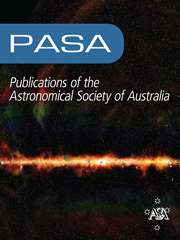Article contents
On the Theoretical Treatment of Stellar Convection Zones
Published online by Cambridge University Press: 25 April 2016
Extract
The theory of stellar convection zones has met three difficult problems. They are non-linearity, non-locality, and non-greyness of radiative transport. Non-linearity is inherent in turbulence. Non-locality is due to the nature of convection, that larger eddies are apt to be more unstable as indicated by the fourth-power dependence of the Rayleigh number on the vertical dimension. Inhomo-geneity and anisotropy of convection, penetration into stable layers, are the consequences. Non-grey radiative transfer through an eddy element is important in a convective atmosphere. In a preceding paper, the author has developed a theory which includes all these effects, using the representative eddy approximation. The emphasis in that paper was put rather in the non-locality and in the radiative non-greyness ; the treatment of non-linearity has been considered mainly in much earlier investigations. In the present note, we shall study how the representative eddy approximation is reconciled with the spectral theory of turbulence, and we shall determine the effective Reynolds and Péclet numbers, the coupling constants appearing in the eddy transport coefficients.
- Type
- Contributions
- Information
- Publications of the Astronomical Society of Australia , Volume 1 , Issue 8 , September 1970 , pp. 379 - 381
- Copyright
- Copyright © Astronomical Society of Australia 1970
References
- 3
- Cited by


